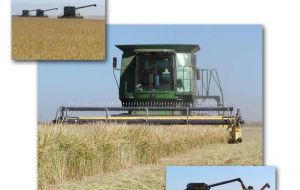MercoPress. South Atlantic News Agency
Agriculture showing more resilience to economic crisis
 FAO does not rule out episodes of extreme price volatility
FAO does not rule out episodes of extreme price volatility Because food is a basic necessity, the agriculture sector is showing more resilience to the global economic crisis than other industries. But the risks could increase if the economic downturn deepens, according to a new report by the OECD and FAO released this week.
Falls in agricultural prices and in the production and consumption of farm goods are likely to be moderate as long as the economic recovery begins within two to three years, says the OECD-FAO Agricultural Outlook 2009-2018.
As the downturn lowers food prices, pressure is eased on recession-hit consumers who have less money to spend, it says.
Food prices have come down from the record peaks of early 2008 but they remain high in many poor countries. Over the coming decade prices for all farm commodities except beef and pig-meat - even when adjusted for inflation - are unlikely to fall back to their average levels before the 2007-08 peaks.
Average crop prices are projected to be 10-20% higher in real terms (adjusted for inflation) for the next 10 years compared with the average for the period 1997-2006. Prices for vegetable oils are expected to be more than 30% higher.
An expected economic recovery, renewed food demand growth from developing countries and the emerging bio-fuel markets are the key drivers underpinning agricultural commodity prices and markets over the medium term.
The report warns that episodes of extreme price volatility similar to the hike in 2008 cannot be ruled out in coming years, particularly as commodity prices have become increasingly linked to oil and energy costs and environmental experts warn of more erratic weather conditions.
Although agricultural production, consumption and trade are expected to increase in developing countries, food insecurity and hunger is a growing problem for the world's poor.
The report argues that the longer term problem is access to food rather than food availability, with poverty reduction and economic growth a big part of the solution.
Agriculture growth is key for sustainable development and poverty reduction since 75 percent of the poor in developing countries live in rural areas.
The report says that, in addition to more effective international aid, governments can best support domestic agricultural development through targeted policies such as infrastructure investment, establishing effective research and development systems and providing incentives for sustainable use of soil and water.
It also emphasises the need for greater opening of agricultural markets and broadening economic development beyond farming in poor rural regions.




Top Comments
Disclaimer & comment rulesCommenting for this story is now closed.
If you have a Facebook account, become a fan and comment on our Facebook Page!